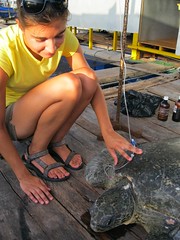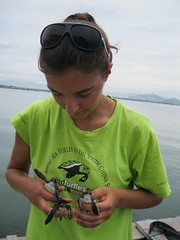Oregon State University graduate Rebekah Smith majored in Public Health and minored in Psychology. As spring term was coming to a close in Corvallis, Rebekah was nearing the end of her internship in Quito, Ecuador with Child Family Health International (CFHI). As an IE3 Global Internships scholarship recipient, Rebekah participated in an internship involving medical rotations, and was able to reflect on her experience while still abroad.
I am now ending my seventh week in Quito, Ecuador. I have three more weeks in this amazing country and am in no way prepared to leave. To provide some insight into how huge of a development this trip has been for me, let me explain just how new international travel was to me just seven weeks ago. Prior to this trip, I had never left the United States, nor  even had a passport of my own before applying to intern with CFHI and IE3. Understandably, these factors led me to have a ton of anxiety, which combined with the fact that I did not speak any Spanish. Despite the many “firsts” I’ve tackled recently, I have grown not only comfortable overseas, but have developed a huge passion for traveling and experiencing other cultures.
even had a passport of my own before applying to intern with CFHI and IE3. Understandably, these factors led me to have a ton of anxiety, which combined with the fact that I did not speak any Spanish. Despite the many “firsts” I’ve tackled recently, I have grown not only comfortable overseas, but have developed a huge passion for traveling and experiencing other cultures.
My internship involves attending clinical rotations and taking Spanish classes with incredible instructors in Quito on weekdays. I’ve found that having some responsibilities in the city makes me feel as though I have a purpose here and am bettering myself professionally. My biggest words of wisdom when spending time in another country’s healthcare system would be to remember why you are there. This can be very difficult, especially with regards to healthcare because systems can vary so greatly between countries. Remembering that you are solely there to learn will help when experiencing things completely different from the U.S. It will only cause stress to think that you are there to fix issues or judge another country’s healthcare system. Our purpose as interns is to act like sponges, learn everything we can, and return to the U.S. with a better perspective and deeper compassion for health care. This concept will help you in all areas of interning with this program. When I was volunteering in the schools I also had to remember this because they teach different subjects and use different techniques than we do in the states.
On the weekends, I am TRAVELING! Traveling has been such a huge aspect of my experience here and has taught me about the culture and count ry just as much as the program itself has. Traveling to the different Ecuadorian cities is such an incredible experience because within a few hours you can be in the Andes Mountains, on the beautiful coast, or deep in the jungle. Traveling forces you to practice Spanish and allows you to meet an outstanding amount of people, both foreign and local. I have traveled to a cloud forest in Mindo, the sunny beach in Montanita and Canoa, and am soon traveling to a gorgeous volcano in Cotopaxi. I also have plans to yonder on to an adventure-filled town called Banos, as well as the jungle in Tena. Traveling around is affordable and easy, as well as gives you opportunity to develop a great sense of independence and cultural competency. Traveling is also the way to make everlasting memories with other students in your program! You are stuck on buses together, staying in amazing hostels and going through both stressful and exciting times together.
ry just as much as the program itself has. Traveling to the different Ecuadorian cities is such an incredible experience because within a few hours you can be in the Andes Mountains, on the beautiful coast, or deep in the jungle. Traveling forces you to practice Spanish and allows you to meet an outstanding amount of people, both foreign and local. I have traveled to a cloud forest in Mindo, the sunny beach in Montanita and Canoa, and am soon traveling to a gorgeous volcano in Cotopaxi. I also have plans to yonder on to an adventure-filled town called Banos, as well as the jungle in Tena. Traveling around is affordable and easy, as well as gives you opportunity to develop a great sense of independence and cultural competency. Traveling is also the way to make everlasting memories with other students in your program! You are stuck on buses together, staying in amazing hostels and going through both stressful and exciting times together.
Being abroad in Ecuador has taught me many things so far. One of the most impactful things I have learned is patience. America is very “Type A” and extremely punctual, these things are not a priority in Ecuador. I have waited over an hour for one of my preceptors to arrive at a meeting, I have had doctors show up twenty minutes late to appointments and many other experiences. You are also very commonly juggling your wants and needs with those of the other students who you are working with, and this requires a large amount off adaptability and patience. These experiences have taught me patience, and how to adjust to other cultures. For example, I don’t go anywhere without a book here! It is your job to adjust to them, the entire  culture does not need to adjust to you, so learn to adapt! It’s been nothing but beneficial because I have finished two books just traveling and waiting for meetings, It’s GREAT!
culture does not need to adjust to you, so learn to adapt! It’s been nothing but beneficial because I have finished two books just traveling and waiting for meetings, It’s GREAT!
Some final advice I have is, to bring more money than you expect. You will never be able to be totally prepared for traveling abroad or be able to know what you will be doing. Having money hold you back from being able to engage in a great opportunity would be upsetting so just budget extra! I also advise to release any expectations you have or restrictions you have in the U.S. For example, two of the guys in the program were vegetarians for ethical reasons in America and came to find that it restricted them so much here in Ecuador, and they wanted to be able to experience the culture so they put their expectations aside and decided to return to being vegetarian when they returned home. I really respected their choices because they fully immersed themselves in the culture and benefited from it greatly. As far as avoiding cultural mistakes, I was so lucky to have a friend who had been here for a long time before I arrived, and I was constantly asking her questions and observing how she interacted with locals. This was really helpful for me because I was able to learn polite mannerisms and safe tactics while in Ecuador.
This experience has been life-changing. As cliche as that may be, it truly has been an experience that has helped me grow and develop my independence and cultural competency. I only want to continue the experience, I am NOT ready to go home in three weeks!
This blog was originally published on the IE3 Field Notes Blog. For a link to the original entry, click here.









